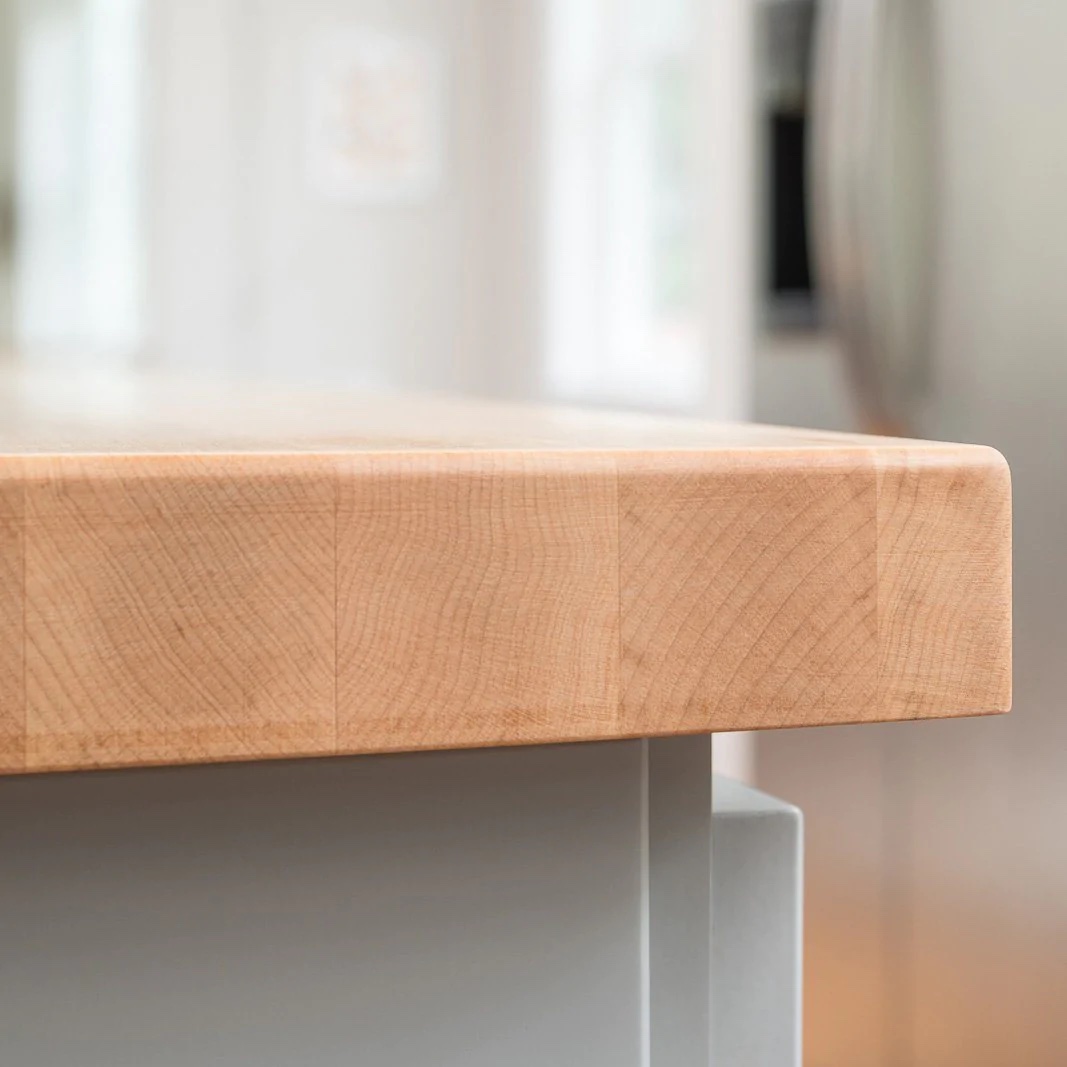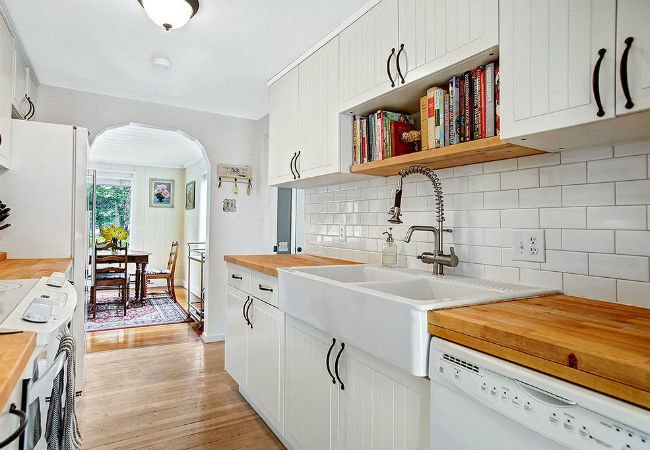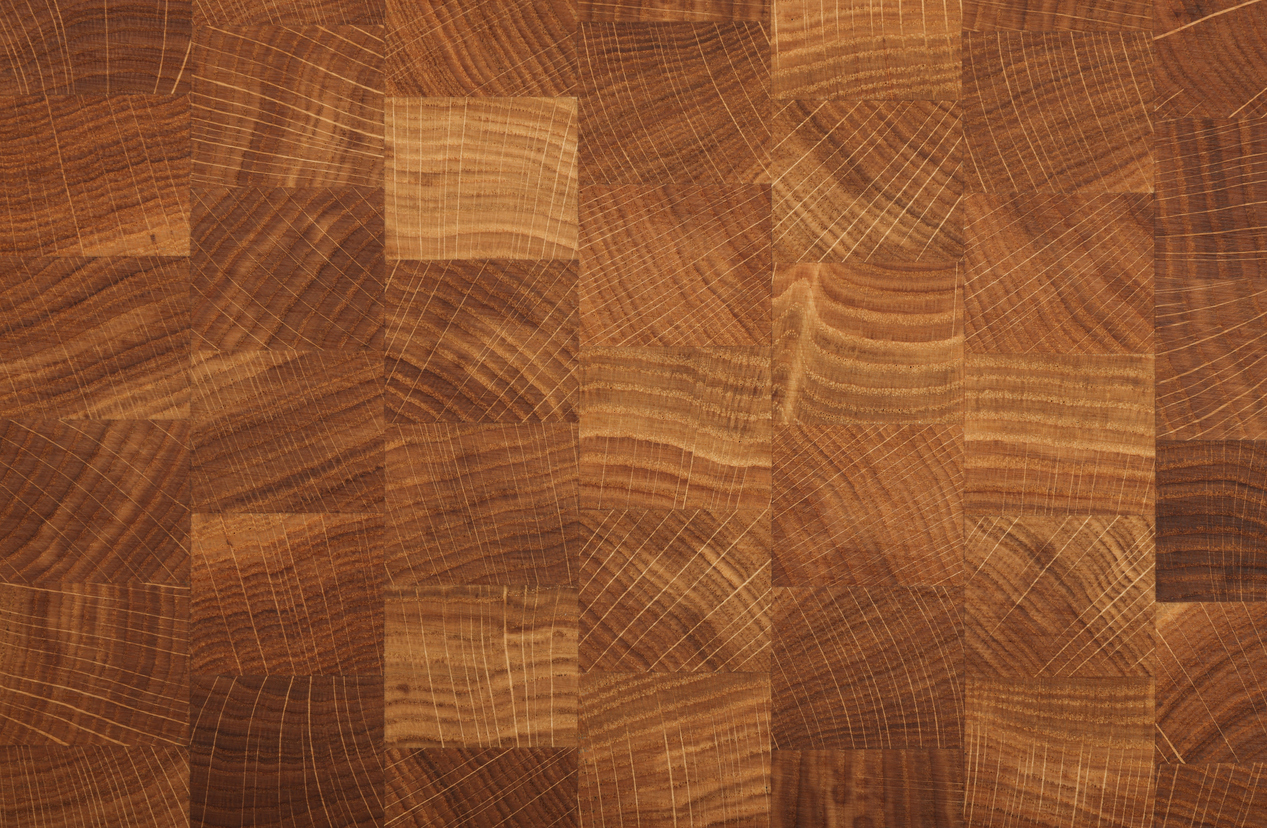

We may earn revenue from the products available on this page and participate in affiliate programs. Learn More ›
Butcher block, which is made from individual wooden strips fused together into a sleek slab, is a timeless and trendy material for kitchen countertops. But its warm tones and “country kitchen” vibes aside, there is a lot about the surface that homeowners don’t know—including real estimates on its cost and required maintenance. To find out if this material right for your kitchen, read through this comprehensive list of butcher block countertop pros and cons before committing to an installation.
PRO: Butcher block is one of the more affordable types of countertops.
The average butcher block countertop cost of materials runs just $20 to $60 per square foot. This range is far more affordable than most other popular options, including stainless steel countertops ($50 to $150), glass ($25 to $100 per square foot), concrete ($25 to $75 per square foot), marble ($40 to $100 per square foot) and quartz ($50 to $200 per square foot).
You can save even more money by choosing a do-it-yourself installation over hiring contractors to do the job. Professional installation typically adds $5 to $10 per square foot to the total cost. For handy homeowners, a DIY butcher block countertop installation isn’t tricky business, either: It involves cutting sheets of wood down to size with a circular saw, creating the necessary holes for sinks and other fixtures, then mounting the various segments over a cabinet with screws.
For context, let’s compare that to another trendy countertop material like quartz. Not only do the materials cost almost twice as much ($70 to $100 per square foot) as that of butcher block, but a quartz countertop installation is not generally a DIY project. A quartz countertop slab is too heavy for one person to lift, has to be cut with a wet saw, and can seriously damage surrounding surfaces in the home (or your feet) if you drop it.
CON: Butcher block is ultra-sensitive to liquid.

Rule number one for butcher block countertop care: Limit its exposure to moisture. You’ve likely been warned to keep wood out of bathrooms and kitchens because of how it reacts to water. Wood can absorb germs, grow mold, stains, or even warp when it’s exposed to moisture. Sealing butcher block countertops immediately following installation (and once a month or so afterward) can counteract these unwanted effects, Yes, butcher block countertop maintenance is a little more involved than it would be had you opted for a nonporous countertop made of glass, stainless steel, quartz, or ceramic tile. Fortunately, all it takes is one to two coats of food-safe mineral oil, such as Howard Products Cutting Board Oil or walnut oil (like Mahoney’s Finishes Walnut Oil Wax) applied with a soft cloth. These nontoxic sealants create barriers that keep spills from penetrating the wood, thus preventing water damage.
Every 10 years, or as needed when the countertops grow stained, use sandpaper to sand away the old sealant. Start with 80- to 100-grit, then move up to 220-grit sandpaper as the surface smooths out. Go over the sanded surface again with oil to make it look like new.
PRO: Cleaning butcher block countertops is a cinch using basic household ingredients.
While soap can streak or spot shiny glass or stainless countertops and acid-based cleaners can erode quartz countertops, both are safe to use on a butcher block. In other words, cleanup is not rocket science!
For everyday cleaning of butcher block countertops, scrape off food debris with a plastic spatula, then use a dish sponge saturated in a solution of 2 cups warm water and 1 teaspoon of dish soap to wipe away the residue. Vinegar cleans butcher block as well as soap and water, and disinfecting the countertop as well as cleans it. To tackle butcher block countertop stains, sprinkle table salt over the stains, then gently rub them with half of a lemon to remove it.
CON: Butcher block countertops ding easily.

Because they are softer and more yielding than glass, granite, and stone, butcher block countertops are more vulnerable to scratches and dents. One way that homeowners prematurely wear their butcher block countertops is by using them as cutting boards.
Despite the name “butcher block,” you’d do well to resist the urge to chop directly on its surface. Knife blades can cause uneven wear on certain regions of your countertop, so use a dedicated cutting board for cooking prep work instead.
If a wayward knife stroke dents the countertop, sand down the dent with a fine-grit sandpaper (220-grit or greater) and then apply mineral oil to the spot. You can use this same solution to remove burn marks on the countertop left by a hot pot.

PRO: You can choose from a variety of hardwoods and grains to suit your style.
Unlike uniform countertops of glass or stainless steel, butcher block allows you to customize the hue and pattern of your countertop through your choice of wood and wood grain. You can choose from a variety of hardwoods, each lending a distinct color and character to the countertops and your kitchen’s overall scheme. Teak and cherry wood confer a dark and dramatic effect; oak evokes a classic, colonial feel; and blonde bamboo is an excellent option for a modern sustainable home.
You can further define the look of your space through your choice of wood grain, or the pattern visible on the surface of your butcher block countertop. The two primary types of grains are edge grain and end grain. The surface of edge-grain butcher block resembles a series of long, lean strips like the sides of a 2×4. The surface of end-grain butcher block (see below) looks like a checkerboard comprising the short ends of a 2×4.

CON: Butcher block expands or contracts as the ambient temperature fluctuates.
As it does with water, wood swells or shrinks with changing temperatures. Homeowners can expect their butcher block countertops to expand by roughly ⅛- inch in summer and contract by the same amount in the winter. Now, if you don’t prepare for this fluctuation by leaving enough room along the perimeter, the wood’s expansion could cause it to warp or crack.
It’s not difficult to create enough wiggle room for your countertop to expand and contract. If you’re installing a butcher block countertop over an open cabinet top (rather than a solid underlayment), leave 1/8 inch between the edges of the countertop and the walls. If your cabinets have a solid top, mount furring strips to the top of the cabinet. Then, rest the countertop on top of the strips so that it has room to breathe.
PRO: Butcher block countertops can last for a couple of decades.
Follow the above tips on installation, sealing, and cleaning your butcher block countertops, and the surface should last for 20 years or longer. This gives it a major advantage over laminate countertops, which typically last for only 10 to 15 years, and puts it on par with ever-durable granite countertops, which also last at least 20 years.
If these butcher block countertop pros and cons leave you thinking that wood isn’t the best fit for your future kitchen, consider installing one of these other countertop materials.
